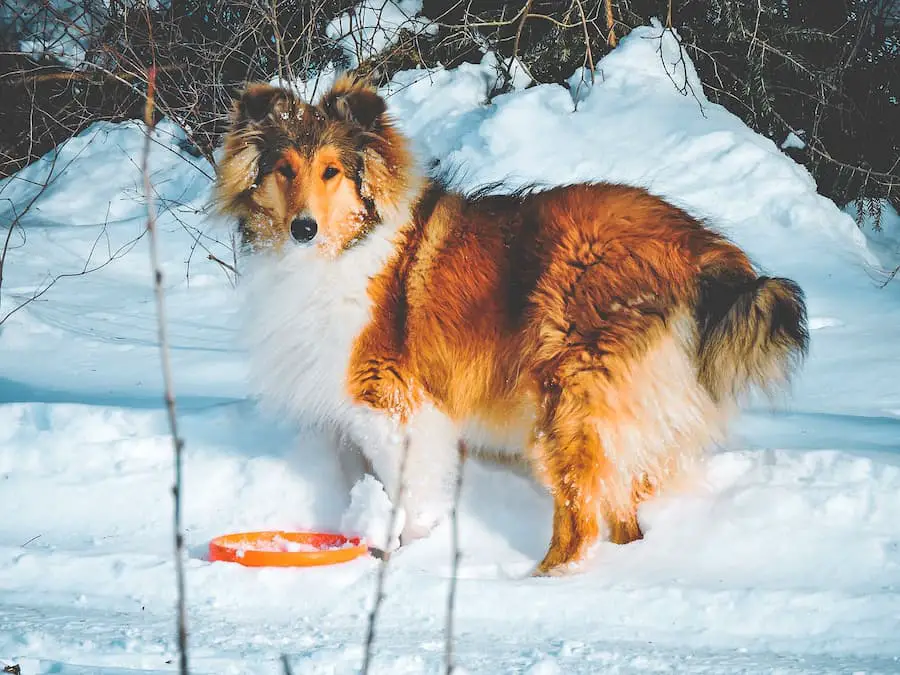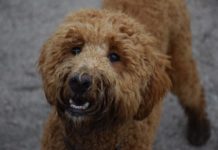Dealing With A Rough Collie Puppy Biting
Your rough collie puppy has a mouth filled with 28 small, razor-sharp teeth that always seem to be attracted to biting at their owners’ fingers and toes. Although it’s annoying, this behavior is completely normal for a rough collie puppy and fortunately something that can be trained away.
Why Your Rough Collie Puppy Is Biting
Collie pups get their baby teeth at a much younger age than human babies — as early as two-weeks old. As your young collie grows, they’ll explore their world more and more with their mouth. At around 3-to-4-months-old, puppy’s teeth begin to fall out, making room for 42 adult teeth.
This teething process can be very painful for your puppy, as their gums will be tender and sore. When teething begins, you may notice some drooling or see little spots of red on their toys, although this is normal. If you notice anything unusual, then talk to your veterinarian just in case there is a more serious issue.
Once your rough collie reaches 6-months-old, their baby teeth should have all fallen out. According to the AKC, you may find a puppy tooth on the floor, although it’s more likely for a puppy to swallow most of the teeth. If you find some teeth that haven’t fallen out, be sure to tell your veterinarian.
Preventing Your Rough Collie Puppy From Biting
It’s normal for collie puppies to nip at each other while playing, sometimes not realizing how hard they’re able to bite down without hurting the other puppy. If a puppy bites too hard, another puppy will make a loud yelp, warning the puppy, “Hey, that hurts!”
You can teach your collie puppy that biting hurts with a loud, high-pitched “OW” when they bite you, then give them a treat or verbal praise when they calm down. However, some puppies may get worked up if you yell. If this is the case, just turn around quietly or walk away, or gently put the puppy in a crate for a few minutes to calm down.
Now is the perfect time for teaching your young collie to learn to moderate the force of their bite, known as bite inhibition. A puppy that learns bite inhibition will, in their older years, put their mouth on you or someone else, like a vet, if they’re in pain, but it probably won’t hurt you because they’ve learned to moderate the force of their bite.
After teaching your collie pup that biting is painful, let them know what they could chew or bite on. If your pup starts nibbling at your fingers or toes while you’re playing, offer them a toy instead. Try keeping toys close by so you can easily reach them quickly, offering them a better alternative when they feel the need to chew.
If your puppy continues to bite you, stop the play session so that they realize that biting won’t be rewarded with your attention. You may also want to redirect your collie puppy excessive energy with some outside playtime or a walk. Never hit your puppy or punish them physically. If you think your collie is biting out of aggression, speak to a veterinarian or a dog trainer about ways to deal with that behavior.
Management
It’s important to set your collie puppy up for success by managing their environment. Use their playpen, crate, leash, baby gates to keep them from chewing your furniture, or biting your favorite shoes. If you don’t prevent them from practising these behaviors from a young age, they’ll learn that chewing on these items is extremely fun! This will mean that it’ll take far longer for a puppy to grow out of biting.
Enrichment
As it’s normal and natural for a young puppy to bite, it’s very important to provide an appropriate outlet! This can be done by keeping your puppy’s mouth busy on puzzle toys like Kongs, Toppls, and Licki Mats. As they’re probably teething, freezing some of their toys will help ease their sore gums.
Biting often goes hand in hand with tugging and chasing. If your collie pup is chasing your kids or playing tug-of-war with their clothes, then consider a flirt pole toy. This toy is a great way for redirecting chasing and biting onto something more appropriate and is good for wearing out an active puppy.
Lastly, consider setting up safe-socialization opportunities. Playtime with other puppies is a great way for your collie puppy to get feedback on their bite pressure.
Training
As your collie puppy ages, you should avoid using your hands to play with them! The same goes for the rest of the family, as everyone needs to be on board with the same rule. Many ways in which humans play with puppies actually contribute to a puppy continuing to bite. Wrestling with a puppy, especially using your hands, can confuse the puppy on when it is okay to bite and when it is not. It’s best to avoid these games with your puppy, especially during their development stage when bite inhibition is being taught. Anytime you want to play with your puppy, try using a toy rather than just your hand!
You can reduce your puppy’s frustration by teaching recall, leash walking, and relaxation skills. Puppies often get nippier when they’re frustrated and tired.
Never Punish Your Puppy
Punishing your puppy for biting, either physically or verbally, won’t stop them from doing it. Using punishment will only cause more frustration and fear, which could manifest into more growling, barking, harder biting, or even more aggressive behavior. The use of punishment will ultimately ruin the bond that you are trying to create with your puppy. Stick to using positive reinforcement training, management, and enrichment!
Conclusion
Even the calmest and best-behaved collie puppy is prone to biting — it’s just their nature. The good news is that with the right approach, practice and positive reinforcement, you can teach your puppy not to bite, preparing your puppy for a lifetime of good socialization and great behavior.








